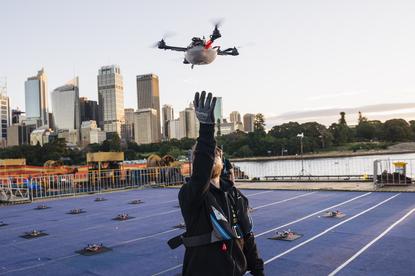CASA seeks app for drone flyers
- 23 August, 2016 09:48

Intel's Drone 100 performance at Vivid Sydney earlier this year.
The Civil Aviation Safety Authority is commissioning an app to help recreational and professional drone flyers avoid restricted airspace ahead of changes to operating laws which come into force next month.
The RPAS (Remotely Piloted Aircraft Systems) app will allow users to enter or find their location on a map, and display red and amber bubbles around nearby no-fly zones.
The app will also record a flight history, which will be sent to CASA for analysis after it is deidentified, as well as issue notifications from state fire authorities about local hazards.
The authority issued a call for expressions of interest from app-builders to be received by September 12.
In the EOI, CASA said the purpose of the app was to educate and inform flyers, as well as ‘encourage recreational RPAS flyers to operate responsibly’ and ‘assist in reducing the number of incidents of unsafe operations’.
The app will indicate the different restrictions that apply to controlled and non-controlled aerodromes, helicopter landing sites and other airspace restrictions and hope to educate Australia’s ever growing number of recreational and commercial flyers.
A number of apps exist that serve a similar function, however none are endorsed by CASA.
Law change
Laws around flying drones commercially are being relaxed on September 29 so operators wanting to fly RPAs under 2 kilograms will no longer require a remotely piloted aircraft operator's certificate (ReOC) from CASA.
Commercial operators will still need to notify CASA ahead of their first flight. All flyers are required to maintain line-of-sight with their drone and not fly closer than 30 metres to vehicles, boats, buildings or people. Flying over populous areas such as beaches, heavily populated parks, or sports ovals is also prohibited.
The use of drones in a variety of business functions has taken off in recent years. Last month the Queensland government earmarked $1 million for a Boeing-led drone research project. An Israeli company that offers a fully automated industrial drone system recently announced plans to expand to Australia and raise funding locally.
CASA has the power to issue fines for breaching safety regulations of up to $9000. If someone is injured by a drone, the authority can seek prosecution.
Last year, a Queensland drone pilot received an $850 fine based on videos he had uploaded to YouTube.

